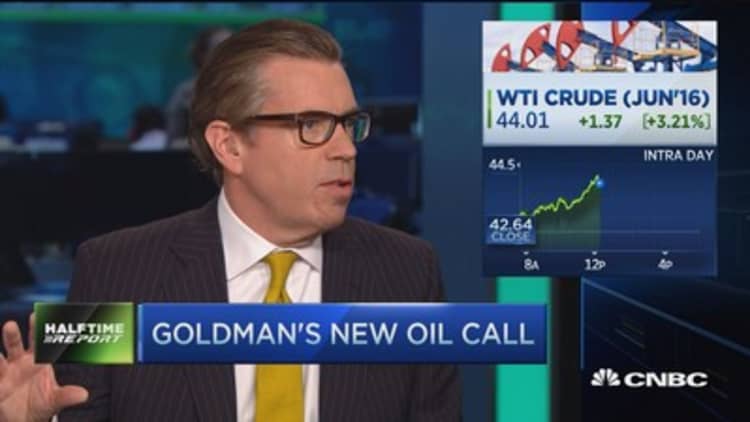
Dividends are sacrosanct in the world of integrated oil and gas, but Goldman Sachs' global head of commodities research said Tuesday prices may stay low enough for long enough to force big oil to cut the payouts.
Goldman's Jeff Currie made his comments shortly after Standard and Poor's downgraded ExxonMobil's credit rating from the coveted AAA to AA+, citing continued oil price weakness.
Crude prices have bounced off multi-year lows struck earlier this year, but remain roughly 60 percent below their 2014 peak.
"A lot of these dividends were put in place when oil prices were $110, $120 a barrel," Currie told CNBC's "Fast Money: Halftime Report."
"Obviously if we stay in a $50-to-$60-type price environment most of these companies have embedded in their outlooks, it's going to be very difficult to actually make those types of dividend payments that were structured in the previous era."
Goldman sees oil prices ending the year at $45. Currie says the bank's view would suggest Exxon and its peers are in a position in which they must cut dividends.
Last week, Goldman said it had shifted its near-term energy weighting from underweight to neutral, though Currie warned on Tuesday the change in fundamentals is only transitory at this point.
He said seasonal risks that could lead to a storage crisis have passed until October, and near-term fundamentals have moved global supply and demand toward balance.
"You look at the inventories, globally, they're balanced right now, but we don't think it's sustainable until the third quarter and beyond," he said.
Other analysts believe the majors have brought down costs enough to fund dividends.
In an earnings preview, Cowen and Co. said "operational efficiencies, cost reduction, and asset sales should allow [integrated oil companies] to sustain dividends and bridge the funding gap through 2017."
ConocoPhillips slashed its dividend by two-thirds earlier this year. Chevron and Exxon have maintained their dividends of 4.2 percent and 3.3 percent, respectively, but both have suspended stock buybacks.
BP, which reported better-than-expected earnings on Tuesday, has said it would take on more debt to fund its 7.3-percent dividend, but warned it would be forced to reassess its financial framework in the event oil prices remain low, Cowen noted.
Tighter margins in BP's downstream refining business, combined with weakness in its upstream gas exploration segment, could make its dividend unsustainable, RBC Capital Markets said in a note.




